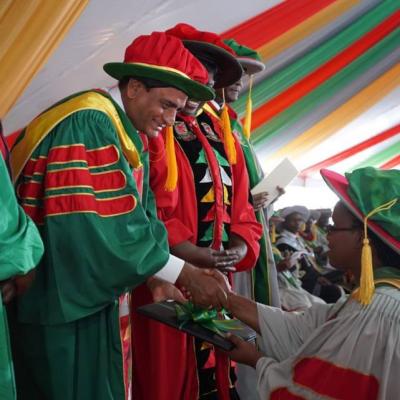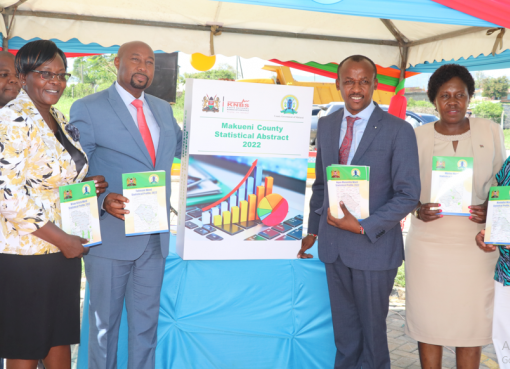Education Cabinet Secretary Mr Ezekiel Machogu has said reliance by public universities on tuition fee collections and government funding alone was no longer sustainable and urged institutions of higher learning to seek new modes of funding to keep themselves afloat as traditional revenue streams run dry.
Mr Machogu indicated that institutions’ managers should consider tackling the current financial challenges through strategies such as enhanced use of technology to cut costs, exploring new markets, improving efficiency in their operations, seeking partnerships and endowments and prioritizing what academic programmes to offer competitively.
The CS noted that though Kenya’s universities are staring at financial crises, the situation presented an opportunity to the institutions to think more creatively and innovatively to generate resources.
The institutions have also been urged to rethink strategies on higher education and shift to technical, vocational education and training that equips graduates with practical competencies for self-employment and income-generation.
He said universities must enhance revenue collection by developing and implementing a policy on raising resources from other avenues including competitive research, entrepreneurship grants, alumni associations, continuous education, community service and business investments.
Mr Machogu said that universities should continue investing in meaningful collaborative research and innovations to attract funding and guarantee quality of education.
For a long time, the universities relied on state funding and revenue generated from the fees paid by parallel degree students. But all that was dealt a fatal blow when the government cut its funding and reforms in the national examinations in 2016 disabled “Module II” as all eligible Form Four leavers secured a place in the regular stream.
All 35 public universities are experiencing financial difficulties. They are not only unable to pay salaries but have also not been remitting statutory deductions. These challenges point out that the universities are not playing their traditional role of teaching, research and training.
Today, the employees are owed a total of more than Sh7.9 billion, including pension fund contributions.
He said the government will endeavour to increase research funding.
“We wish to empower those with the capacity and interest in research by recognizing and supporting them with funding so that they get into innovations and support us in finding solutions to challenges confronting us,” said the CS, in a speech read on his behalf by Principal Secretary for State Department of Higher Education and Research Dr Beatrice Inyangala during Egerton University’s 46 graduation ceremony.
The event was graced by, The Chancellor Dr Narendra Raval, Vice Chancellor Professor Isaac Kibwage and Chairman of Council Dr Luka Hukka Wario.
The CS called on public universities to be more innovative to get support through creating endowment funds and philanthropy adding it was also possible to monetize consultancies in their areas of expertise as possible sources of funding. Solely depending on the Exchequer, he observed will not be sustainable in the long run.
Among the measures the CS has advised universities to put in place to stay afloat include crafting public-private partnership, rationalization of non-teaching staff and leasing of assets at current market rates.
Experts have proposed that universities outsource services such as security, cleaning among others to cut costs while middle level staff be put on contracts.
The event that was held at the University’s Graduation Square at the Njoro Main Campus was the first to be conducted physically since 2020 when the Covid-19 pandemic struck. During the occasion 8 graduands were conferred with PHDs, 26 with Masters Degrees and 1203 with Bachelor’s degree while 50 were awarded diplomas.
Mr Machogu urged institutions of higher learning to align their courses with employment creation and current market needs.
He stated that the world over the labour market was transiting from theoretical expertise to practical-based skills adding that a growing number of Kenyans with good academic qualifications were unemployed because of a mismatch of skills and career choices.
“The world over, employment is not based on mere certificate, diploma and degree qualifications, but on the skills employees are expected to contribute. The premise that education is necessary for development, growth and poverty reduction is undisputable. Nevertheless, economic development depends on the knowledge and skills that people acquire, not necessarily the number of years that they sit in a classroom,” added the CS.
In her remarks, Dr Inyangala said that investment in higher education has to prioritize skills development, which is not to diminish the traditional academic programmes as they have their place — but they should not be the only centre of focus.
Prof Kibwage said in the wake of the financial crisis, the university council is exploring other means of dealing with the cash crunch at the university.
Without elaborating further, the Vice Chancellor said: “The university council is looking at other means to deal with the financial challenges facing Egerton.”
He said the constant legal suits are counterproductive to the institution because students shy away adding, “When this happens I remain with staff with no work and they will ultimately suffer the consequences of redundancies.”
Prof Kibwage welcomed the move by the government to reintroduce a self-sponsored student programme at public universities.
“This is a good move because obviously, it will bring some relief to public universities with financial challenges,” said Prof Kibwage.
By Jane Ngugi



